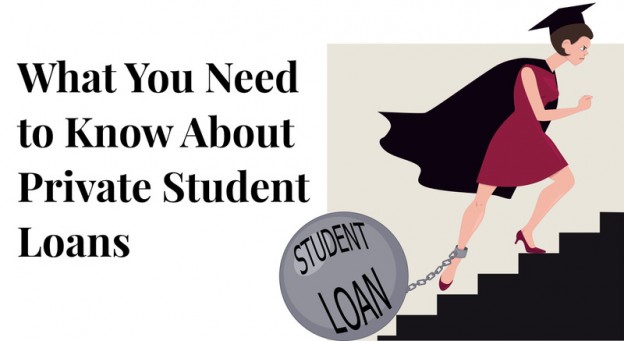It’s an unfortunate trend in college pricing–the average cost of tuition and fees at four-year public and private institutions are significantly higher than they were just a decade ago. For example, the average published tuition and fee price of a full-time year at a public four-year institution is 40% higher, after adjusting for inflation, in 2015-16 than it was in 2005-06. (Source: Trends in College Pricing, College Board, 2015) As a result of these rising costs, many individuals have to rely on student loans to help fund their college education.

Will I have to take out private loans to finance my college education?
What can be surprising to many first-time student borrowers is how little federal student loan debt they may be allowed to take on. Currently, the maximum amount students can borrow for college in federal Direct Stafford Loans is $5,500 during their first year, $6,500 during their second year, and $7,500 during their third and fourth years. (Source: Federal Student Aid, U.S. Department of Education, 2015)
In most cases this amount is not nearly enough to cover the cost of attending a four-year college, and many student borrowers must look to private student loans to help close this gap. And while taking out private loans to pay for college is a fact of life for many individuals, there are some important questions you’ll want answered before taking out these types of loans.
What is the interest rate on the loan?
Private student loans tend to have higher fixed interest rates than federal Direct Stafford Loans. However, depending on the lender, you may be able to choose a loan that offers a lower variable interest rate.
Keep in mind that with a fixed rate, the interest rate remains the same from the day you take out the loan until the day you pay it off. With a variable rate, your interest rate may initially be lower than a fixed rate but then will be adjusted periodically to keep up with changes in market conditions. If your interest rate rises, your monthly payment and/or the number of payments required will increase.
What repayment options are available?
Unlike federal student loans, which offer repayment programs such as pay as you earn, income-based repayment plans and student loan forgiveness, private lenders are not required to offer specific repayment assistance to borrowers struggling to make payments.
However, most private student loan companies do offer limited forms of repayment options, such as loan forbearance or extended repayment schedules. The types of repayment programs offered will vary from lender to lender.
Is a co-signer required?
Some private lenders may require borrowers to have a co-signer guarantee a loan, especially if a borrower has little or no credit history. Having a co-signer may also help you obtain a lower interest rate for your loan and improve your chances for loan approval.
The good news is that the co-signer doesn’t necessarily have to be tied to the loan forever. Most lenders will allow borrowers to apply for a co-signer release after a certain number of on-time payments have been made and other loan conditions have been met.
Are the terms of the loan favorable?
As a result of recent increased regulatory scrutiny surrounding private loans, many of the larger lenders have improved the lending process by offering more attractive loan terms.
For example, certain lenders have eliminated “auto defaults,” which is when a co-signer dies or declares bankruptcy and the lender demands that the loan be paid back immediately by the borrower. Others have made the process for obtaining a co-signer release easier and more transparent. Loan costs, discounts, terms, and conditions can differ greatly, depending on the lender. It’s important to thoroughly research each potential lender and carefully compare all offers before signing a loan agreement.
Are other financing options available?
When it comes to using private loans to pay for college, student borrowers should try to graduate with the least amount of private student loan debt possible. It’s generally a good idea to exhaust all federal student loan options and avoid taking out loans for the maximum amount that is offered by private lenders unless absolutely necessary.
Additional financing options should also be considered, such as:
- Parent PLUS loans
- Grants or scholarships
- Parent/family loans
- State-sponsored student loan programs
- Part-time employment


